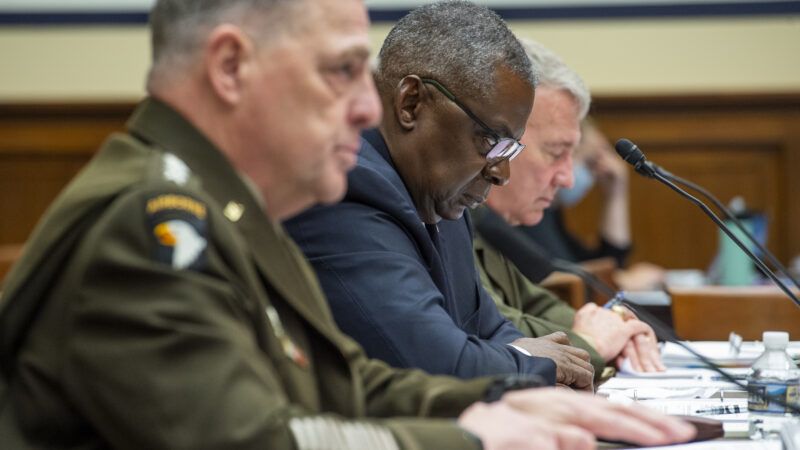Until the Very End, the Generals Wanted Biden to Leave 2,500 Troops in Afghanistan
That would have been a huge mistake.

Military officials appeared before the Senate Armed Services Committee on Tuesday to discuss the conclusion of military operations in Afghanistan, as well as President Joe Biden's handling of the extraction. Those present included Mark Milley, chairman of the Joint Chiefs of Staff; Lloyd Austin, secretary of defense; and Kenneth McKenzie, commander of the U.S. Central Command.
The session marked the first time that these top military officials had all appeared in front of Congress since the Kabul airport suicide bombing that killed 13 U.S. troops and dozens of fleeing Afghans. It was also the top brass's first opportunity to comment on the drone strike that military officials initially insisted had killed only Islamic State militants. (It had, in fact, accidentally hit civilian targets.) For Milley, in particular, this was also his first visit to Congress since reporting revealed that he had reached out to his counterpart in the Chinese government to assure him that he would provide a warning before acting on any potentially aggressive orders from outgoing President Donald Trump.
In his testimony, McKenzie indicated that earlier this year, he recommended that Biden leave a residual force of 2,500 troops in Afghanistan, afraid that a complete withdrawal "would lead inevitably to the collapse of the Afghan military forces and, eventually, the Afghan government." Milley confirmed that he agreed with the advice.
Immediately, Republicans seized on this admission: Sen. Ted Cruz (R–Texas) tweeted that the administration "ignored the advice from the military and mislead the American people," and that had their advice been followed, "Biden's botched Afghan withdrawal could have been prevented and American lives could have been saved." Sen. Jim Inhofe (R–Okla.), who had asked the initial question, later tweeted a video in which he criticized the Biden administration for "not listening to his advisors" on the issue.
In response to a question from Sen. Elizabeth Warren (D–Mass.), Austin acknowledged that while there were "a range of possibilities" for what could have happened with a theoretical continued presence, "if you stayed there at force posture of 2,500, certainly, you'd be in a fight with the Taliban. And you'd have to reinforce yourself."
This is the crux of the matter: There is no plausible scenario in which the U.S. could leave behind a permanent, or even indefinite, force of soldiers without incurring further casualties. The Doha Agreement negotiated under Trump set an end date by which all American forces would have left Afghanistan, barring any future Taliban violence; a new administration reneging on that deal would certainly have invited renewed bloodshed. And a force of 2,500 facing the entirety of a renewed Taliban would have necessitated further reinforcement. At that point, we would be right back to October 2001, facing an uncertain future and an even more uncertain end goal.
Nevertheless, some Republicans are asserting that McKenzie's answer contradicted what the president had said during an August interview with ABC News host George Stephanopoulos, who asked whether Biden had been advised to leave 2,500 troops in Afghanistan. Biden's answer was, at best, muddled and self-contradictory, saying both that he did not receive such advice, and that the advice was "split."
In the most charitable interpretation of his response, a Washington Post fact check noted that Biden immediately pivoted to talking about how the Taliban, after agreeing to a U.S. withdrawal deadline and abiding by its stipulation against attacks on troops, continued to capture territory throughout Afghanistan, and any effort on the part of the U.S. to try to extend or even expand its presence within the country would not have been taken lightly by an emboldened Taliban now in near-complete control of the country.
The White House contends that this is what the president meant—that nobody advised him he could leave 2,500 troops without risking a return to direct conflict. Whether or not Biden was lying, equivocating, or simply forgetful, the fundamental point remains the same: For all the well-deserved scorn one can heap on Biden's execution of the withdrawal, the only true alternative was not withdrawing at all, and that would have been far worse.


Show Comments (100)